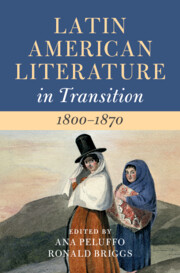Book contents
- Latin American Literature in Transition 1800–1870
- Latin American Literature in Transition
- Latin American Literature in Transition 1800–1870
- Copyright page
- Contents
- Figures
- Contributors
- Acknowledgments
- Introduction
- Part I Aesthetics of Disorder
- Part II Affective Communities
- Part III Intersectional Subjectivities
- Part IV Transoceanic Consciousness
- Chapter 20 Women’s Travel Writing
- Chapter 21 Hydraulic Modernity
- Chapter 22 History and the Transatlantic Imagination
- Chapter 23 Humboldt’s Aesthetic Populations
- Chapter 24 Argentine Darwinists
- Index
- References
Chapter 24 - Argentine Darwinists
from Part IV - Transoceanic Consciousness
Published online by Cambridge University Press: 24 January 2023
- Latin American Literature in Transition 1800–1870
- Latin American Literature in Transition
- Latin American Literature in Transition 1800–1870
- Copyright page
- Contents
- Figures
- Contributors
- Acknowledgments
- Introduction
- Part I Aesthetics of Disorder
- Part II Affective Communities
- Part III Intersectional Subjectivities
- Part IV Transoceanic Consciousness
- Chapter 20 Women’s Travel Writing
- Chapter 21 Hydraulic Modernity
- Chapter 22 History and the Transatlantic Imagination
- Chapter 23 Humboldt’s Aesthetic Populations
- Chapter 24 Argentine Darwinists
- Index
- References
Summary
Darwin has aroused feelings of national pride in Argentina. José Babini recalls that Sarmiento used to jokingly boast that the theory of evolution was Argentinian, given that during his trip through Patagonia, Santa Fe, and the Andes, Darwin was able to observe and gather the physical evidence for the theory that he would go on to develop (34).
- Type
- Chapter
- Information
- Latin American Literature in Transition 1800–1870 , pp. 375 - 388Publisher: Cambridge University PressPrint publication year: 2022

